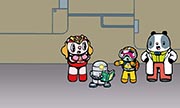Grammar:Reflexive pronouns
【明報專訊】Dr Panda invented a robot with artificial intelligence (人工智能). Pat and Bill are curious about this new invention.
Bill: Look! The robot is reading a book!
Pat: That's awesome! (1) It can learn by itself!
Bill: Well, I think that is kind of horrifying. Have you ever watched movies about robots conquering the world? If they are smart enough, their intelligence may outweigh ours!
Pat: (2) You are just scaring yourself! (3) I can read a book by myself too. Am I going to conquer the world?
Dr Panda: Indeed, Bill is correct. Developing artificial intelligence could be dangerous to the human race. They are learning much faster than humans do. In the worst-case scenario, (4) we may probably harm ourselves by inventing something that is superior to us!◆
Reflexive pronouns end in -self or -selves. We use reflexive pronouns when the subject and the object of the verb refer to the same person or thing.
e.g. The dog is looking at itself through the reflection on a pool of water.
She cut herself accidentally with the knife.
We also use reflexive pronouns with ''by'' to show somebody did something without any help or someone was alone.
e.g. He baked the cake all by himself.
They finish the team project by themselves, without seeking help from the teacher.
■Gear up
Fill in the blanks with the correct reflexive pronouns.
(1) Kids, please behave ___________. (you)
(2) You can see ___________ in the picture here. (you)
(3) As an independent grown-up, we often need to solve the problem by ___________. (we)
(Answers on next text)
■Glossary
curious (adj) 好奇
conquer (v) 征服
outweigh (v) 超越
scenario (n) 場景
[Smarties' Power English 第276期]







